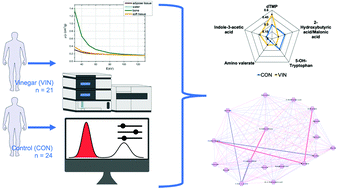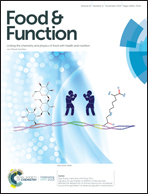Daily red wine vinegar ingestion for eight weeks improves glucose homeostasis and affects the metabolome but does not reduce adiposity in adults†
Abstract
Some studies have reported that vinegar ingestion at mealtime attenuates postprandial glycemia in healthy adults and individuals with type 2 diabetes. Emerging data suggest that chronic vinegar ingestion impacts fat metabolism and reduces adiposity, although no study has yet corroborated the events of vinegar supplementation metabolically through a metabolomics approach. To examine the impact of daily vinegar ingestion on glucose homeostasis, adiposity, and the metabolome, an 8-week, randomized controlled trial design was implemented utilizing two parallel treatment arms: daily red wine vinegar ingestion and a control treatment. Participants were 45 healthy adults at increased risk for metabolic complications as determined by high waist circumferences. Measurements and blood samples were collected pre- and post-intervention. Central adiposity and visceral fat were assessed by waist circumference and dual-energy X-ray absorptiometry, respectively. Plasma metabolites were analyzed using gas chromatography-mass spectrometry (MS) and liquid chromatography-MS/MS. Analysis showed significant reductions in fasting glucose (p = 0.003) and insulin (p < 0.001). Insulin resistance was reduced 8.3% in the red wine vinegar group and increased 9.7% in the control group (p < 0.001). No significant between-group differences in body mass index, body weight, waist circumference, or visceral fat were observed. Significant differences were observed in amino valerate and indole-3-acetic acid (p < 0.05), with high magnitudes of fold change (>2) between groups. Metabolic pathway analysis revealed significant alterations in tryptophan metabolism. Although daily red wine vinegar ingestion for 8 weeks induced significant improvements in glucose homeostasis, our results indicate that daily red wine vinegar ingestion for 8 weeks is not associated with reductions in adiposity. This is the first study to investigate the effects of daily red wine vinegar supplementation using a metabolomics approach. Our results provide strong rationales for larger prospective studies to further clarify associations among obesity, chronic diseases, and functional foods such as vinegar using metabolomics.



 Please wait while we load your content...
Please wait while we load your content...